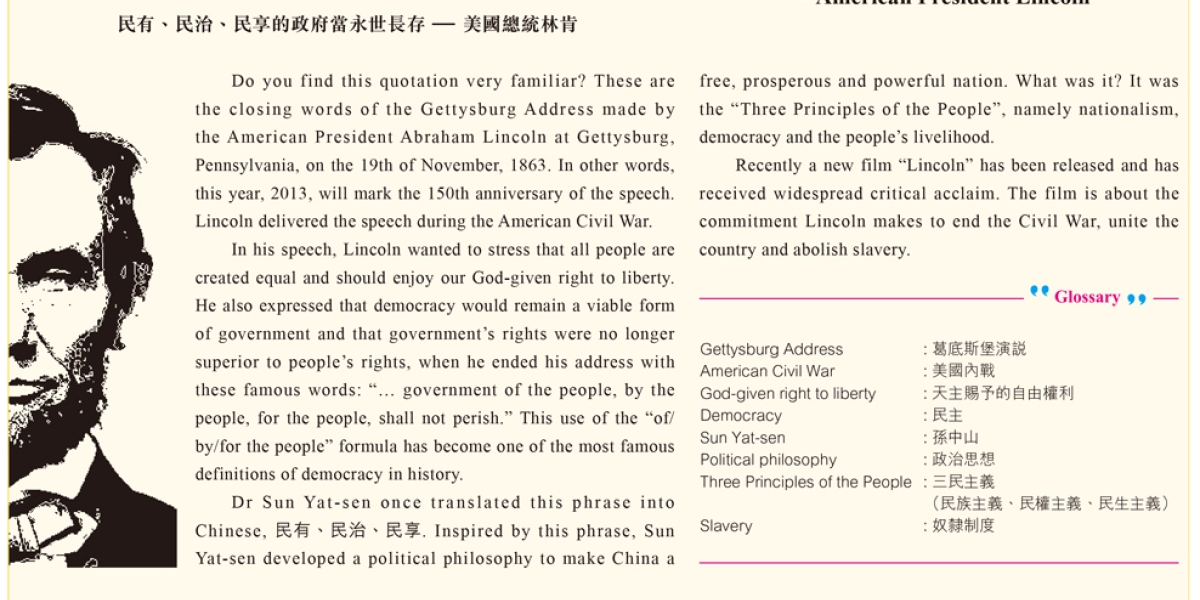昔日文章


Famous Quotations
2013.03.24
Brevity is the soul of wit. — William Shakespeare | 言貴簡潔。 – 威廉.莎士比亞
The above quotation has become a standard proverb in the English language. It means that a wise person should use few but exact words. The quotation comes from the play “Hamlet”(《哈姆雷特》)written by William Shakespeare(1564 – 1616), one of the greatest playwrights and poets in the world.
“Hamlet” is one of Shakespeare’s best-known tragedies. In the play, Prince Hamlet discovers that his father has been killed by his uncle. So he seeks to avenge this deed, which leads him into a world of madness and murder.
What other plays did Shakespeare write? He wrote at least thirty plays. Famous comedies are “The Merchant of Venice”(《威尼斯商人》), “Twelfth Night” (《第十二夜》)and “Taming of the Shrew”(《馴悍記》). Well-known tragedies are “Romeo and Juliet”(《羅密歐與茱麗葉》), “King Lear”(《李爾王》)and “Macbeth”(《馬克白》).
Although Shakespeare lived more than 400 years ago, his plays are still performed and adapted in theatres and movies in different languages all over the world. Students study Shakespeare’s works in school and at university.
Shakespeare also wrote a lot of poems. As his works have greatly influenced the entire English language, you may notice that a lot of English idioms or proverbs came from his works. Examples include “I have not slept one wink” (我都沒闔過眼), “love is blind” (愛情是盲目的) and “all corners of the world” (世界各地).
As Shakespeare used the language of his time, modern people often find it difficult to understand his language and style. Perhaps you can try to read some simplified versions which have been rewritten in present-day English.
Proverb: 諺語
Playwrights: 劇作家
Poets: 詩人
Tragedies: 悲劇
Comedies: 喜劇
Adapted: 改編
Style: 風格
Rewritten: 改寫


Neither East Nor West
2013.03.24
One Last Word on Love It is foolish to love.
IMAGINE when you were 9 months old. (I said imagine because none of us can remember when we were 9 months old.) We are just so cute. We crawl around. Make sounds that no one knows what they are about. We look goofy. And everybody loves us. They even crawl with us, big grownups, and make silly noises with us. They have a ball playing with us…. UNTIL…..
AHHHH! We dirty our diapers.
They sniff and turn their noses and make faces. They then turn to our mom or dad and say, “YOUR kid did a no no.”
Our parents come to us, and smilingly say to us, “OOOOO, you shouldn’t have done that to uncle or auntie.”
We are picked up, and while we are being cleaned up they say very silly things and make weird noises. They sprinkle perfumed powder on us and put on a new diaper. And then we are proudly handed back to their friends to play with us again.
Love makes our parents appear to enjoy changing our diapers. Love makes them do foolish things.
Love is to make someone LOV-ABLE again.
Loving someone requires us to act selflessly when the other person is not very loving or lovable.
Only through love can we do this.
“Father, may this cup be passed from me. Yet not as I will but as You will.” (Mt. 26:39)
In a week, we will celebrate the biggest FOOL in all human history. Jesus died on the Cross in order to make us clean again. He looks foolish climbing that tree (of the Cross). He seems foolish thinking that we will love him in return. He loves us, not because of us, but because of Him. That is why St. Paul says that the Cross is an absurdity. (1 Cor. 1:23) It simply does not make sense. Why would God do that for us unworthy creatures? What have we done to deserve such magnanimity?
At our Baptism, we were born again as children of God. We were made lovable by His Grace. Yet we sin. We (dare I say) poop.
Sometimes we even run around in our dirtied diaper and act like it is nothing, like a little kid running around refusing to have the diaper changed. Our parents have to chase us around just so that we can be cleaned. If our parents love us so much that they want us to be lovable again, how much more is Jesus trying to get us to allow Him to make us clean again.
If you have not been to Confession for a while or for a long time, go this coming week. Look at Jesus on the Cross. Know that He loves you and all He wants is to take away your sins. Please let Him. He wants you to be lov-able again.
If you have friends that have not been to Confession for a while, encourage them. They need to have their diapers changed. Sin really stinks. It is the devil that wants us to think that it does not. Even he knows that we stink. Really, even he does not want us. But Jesus wants us.
One other thing, go to Confession with your family. Afterwards, try to see them as having been made lovable by Jesus. Forgive them as they have been forgiven. If they were babies, you would not have minded changing their diapers. How much more lovable they are when Jesus has cleansed them from their sins. He wants us to love each other as He loves us.
Have a blessed and holy Easter.


Magic Mirror
2013.03.17
Rest
According to the 24 solar terms (二十四節氣)in Chinese calendar, the awakening of the insects(驚蟄)forecasts the arrival of spring every year in early March. Hong Kong can be fairly warm this time of the year but Europe is still snowing! Hibernating(冬眠)creatures will come to sense and prepare another busy year. For us Hong Kong people, it is rather difficult to run away from work for a period of time, but a short break or rest will definitely help to recharge our overloaded mind and soul.
'Rests'(休止符)get different meanings in a piece of music. It can be an indication to stop, to create suspension of a flowing melody or to express a certain emotional state. If we stop at a rest just like watching the traffic lights, it has no meaning at all. Sometimes if you listen specially to the silent beat, you may realize how important and special it is. I remember my teacher who always tells me not only to acknowledge the rest but also to act it out. This may sound a little bizarre(異乎尋常)to non-musicians, but isn't that similar to our hustling lifestyle?
In musical notation, 'rest' represents a silent language, denoting the interval of silence and the symbol represents the value of the rest. A German music theorist, Franco of Cologne from the medieval era(中世紀)once said,“Time is the measure of actual sound as well as of the opposite, its omission.”Very often musicians pay much attention to notes written on the score, rhythm, intonation and precision of a performance, where 'rests' are always forgotten and being treated as unimportant details. Try to stay away from what keeps you occupied once a while; spare a moment to listen to those who need support and consolation from you. We can always make room even time is limited, I am sure a 'rest' can lighten up your day if you treat it as a beautiful melody.


Famous Quotations
2013.02.24
government of the people, by the people, for the people, shall not perish from the earth – American President Lincoln 民有、民治、民享的政府當永世長存 – 美國總統林肯
government of the people, by the people, for the people, shall not perish from the earth
– American President Lincoln
民有、民治、民享的政府當永世長存 – 美國總統林肯
Do you find this quotation very familiar? These are the closing words of the Gettysburg Address made by the American President Abraham Lincoln at Gettysburg, Pennsylvania, on the 19th of November, 1863. In other words, this year, 2013, will mark the 150th anniversary of the speech. Lincoln delivered the speech during the American Civil War.
In his speech, Lincoln wanted to stress that all people are created equal and should enjoy our God-given right to liberty. He also expressed that democracy would remain a viable form of government and that government’s rights were no longer superior to people’s rights, when he ended his address with these famous words: “… government of the people, by the people, for the people, shall not perish.” This use of the “of/ by/for the people” formula has become one of the most famous definitions of democracy in history.
Dr Sun Ya t - s e n once t r a n s l a t e d t h i s phrase i n t o Chinese, 民有、民治、民享. Inspired by this phrase, Sun Yat-sen developed a political philosophy to make China a free, prosperous and powerful nation. What was it? It was the “Three Principles of the People”, namely nationalism, democracy and the people’s livelihood.
Recently a new film “Lincoln” has been released and has received widespread critical acclaim. The film is about the commitment Lincoln makes to end the Civil War, unite the country and abolish slavery.
Gettysburg Address : 葛底斯堡演說
American Civil War : 美國內戰
God-given right to liberty : 天主賜予的自由權利
Democracy : 民主
Sun Yat-sen : 孫中山
Political philosophy : 政治思想
Three Principles of the People : 三民主義
(民族主義、民權主義、民生主義)
Slavery : 奴隸制度


